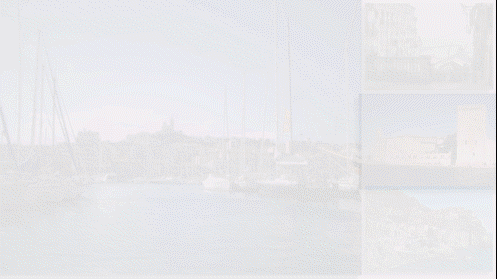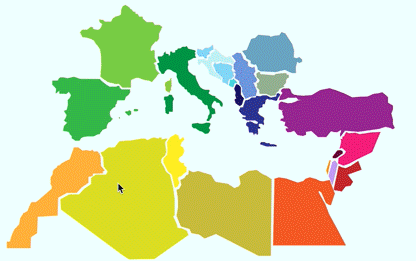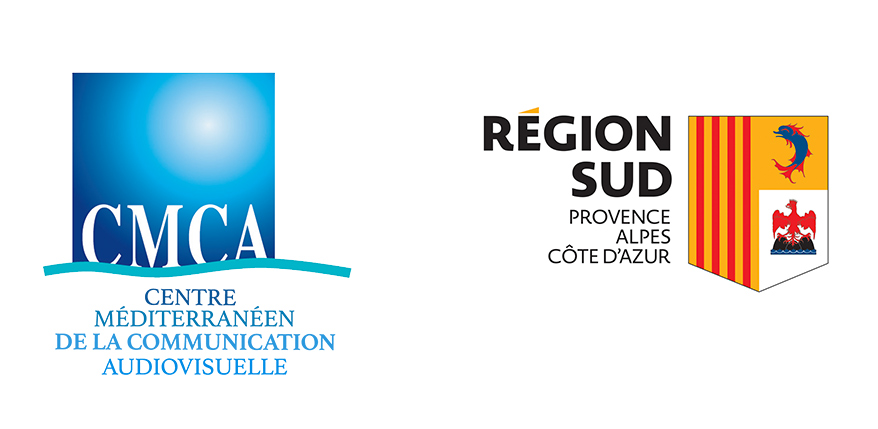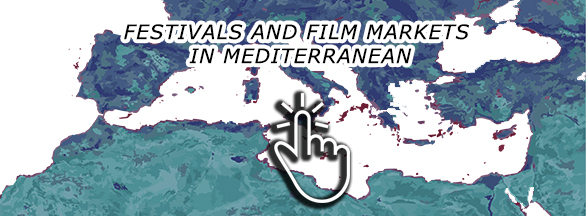Selection for PriMed 2016 : Mediterranean Memory category
-
10 June 2016
-
10 June 2016
-
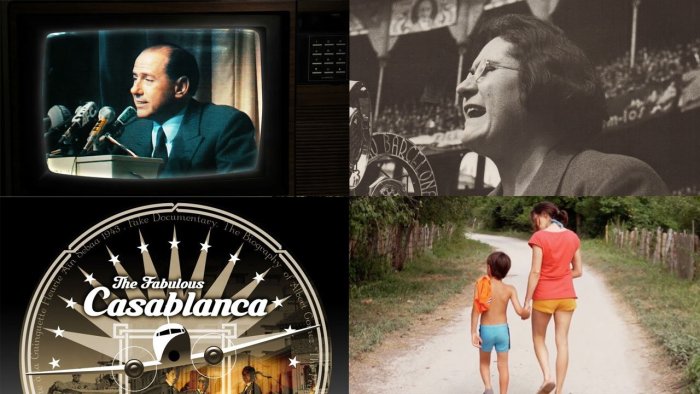
The following is the selection for PriMed 2016 in the Mediterranean Memory category :
– BERLUSCONI ET LA MAFIA. SCANDALES À L’ITALIENNE by Olivier TOSCER
– FEDERICA MONTSENY, L’INDOMPTABLE by Jean-Michel RODRIGO
– LA FABULOSA CASABLANCA by Manuel HORRILLO
– MY OWN PRIVATE WAR by Lidija ZELOVIC
PriMed is the International Festival of Mediterranean Documentary and Reportage. Its 20th edition will take place from November 20th to 26th in Marseille.
www.primed.tv
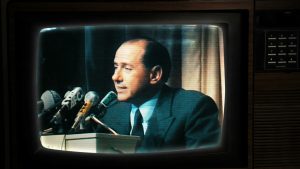 BERLUSCONI ET LA MAFIA. SCANDALES A L’ITALIENNE
BERLUSCONI ET LA MAFIA. SCANDALES A L’ITALIENNE
56 minutes, 2015
Director : Olivier TOSCER (France)
Production : Cinétévé (France), with the participation of France 3 (France)
February 1986. The French discover a businessman with a charmer’s smile and unshakable self-assurance: Silvio Berlusconi. In Italy he was already the king of private television. In Paris, the Socialist President François Mitterrand had just given him a concession to run a new private television channel: La Cinq.
But even back then the highly successful Italian billionaire was controversial, suspected of having links with the Sicilian Mafia.
Getting to the heart of the power system and the machinations of money laundering, this film tells how Cosa Nostra’s protection and dirty money hang over the whole length of Berlusconi’s career, since his beginnings in the Milanese property business to his success in politics, by way of his triumph in commercial television.
With a scenario worthy of a thriller and based on first-hand accounts, many from Berlusconi’s close associates as well as some of the best-known anti-Mafia magistrates, the film also shows how Italy’s most powerful man has always managed to slip through the judicial net.
Olivier TOSCER
Born in 1967, Olivier TOSCER has written and directed six documentary films for different channels: in November 2015, “Djihad 2.0” for LCP-Assemblée Nationale; in August 2015, “Berlusconi & la mafia, scandales à l’italienne” for France 3, RTBF, RTS; in September 2013, “Crise grecque: une faillite européenne” shown on France 3’s “Docs Interdits”, was praised by the press; in 2010, after several investigations into the corruption in French Polynesia, he co-directed for Canal Plus his first film: “JPK, l’homme qui faisait trembler Tahiti”; in 2011 for Arte he wrote and directed “Les millions perdus de l’Europe”, a film about corruption in the European Union; in June 2012, for France 2, he co-wrote and directed the first French film about High Frequency Trading: “Finance Folle: l’attaque des robots-traders”.
Olivier TOSCER has also published four books. The first, “Argent public, fortunes privées”, published by Denoël in 2002 then by Folio Documents, is required reading for several university programmes.
Since 1999 he has also worked at L’Obs. Initially running their financial investigations, he now spends most of his time on the issues of terrorism and major crime.
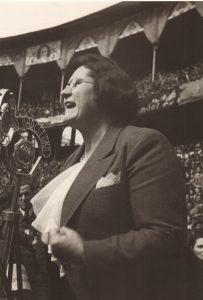 FEDERICA MONTSENY, L’INDOMPTABLE
FEDERICA MONTSENY, L’INDOMPTABLE
52 minutes, 2016
Director : Jean-Michel RODRIGO (France)
Production : Marmitafilms (France), with the participation of France 3 (France) and France 3 Midi-Pyrénées (France)
A leading anarchist, Federica Montseny was elected minister of Spain’s Second Republic in 1936. During her tenure she tried to establish a universal health care system, dared draft laws on contraception, birth control, the rights of single mothers and prostitutes. She passed a law giving women the right to abortion forty years before Simone Veil in France.
After the Spanish Civil War she took asylum in France, living in Toulouse where she continued unabated her fight for libertarian ideas, “mujeres libres” and education.
Jean-Michel RODRIGO
Fascinated by Indian and mixed-race cultures, Jean-Michel RODRIGO has made several TV reports and documentaries about the Andes, slums and mines. The issues being coca, guerillas, social organizations, resistance. Then he turned his attention to Africa, making “Les greniers de l’argent” about farmers fighting for control over their own lives. At the same time he produced “La Guerre des cotons” which brought to light the injustice of the international economic rules which give a handful of American farmers priority over the survival of twenty million African cotton producers. In the same vein, diving into the vortex of globalization, he made “Le business des fleurs” and “Du sucre et des fleurs dans nos moteurs”.
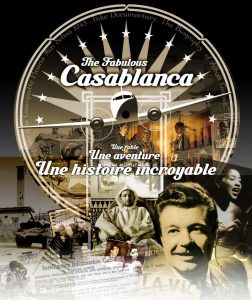 LA FABULOSA CASABLANCA
LA FABULOSA CASABLANCA
80 minutes, 2016
Director : Manuel HORRILLO (Spain)
Production : MLK Producciones (Spain), with the participation of Canal Sur TV (Spain)
“La Fabulosa Casablanca” is a story about nostalgia, glamour – and a certain bitterness – seen through the eyes of Spaniards who, imagining a North African El Dorado, helped create California-on-the-Atlantic, and who were then driven away from it. Using personal memories and testimonies about today’s Casablanca, the film looks at this moment of the 20th century through the mouthpiece of Pedro Casablanc who, like Manuel Horrillo, is from Casablanca, helped by the playwright Cándido Carrasco and actor Jean Reno. We also see rehearsals of a play about the colonial conflict which in 1950-1970 put an end to the convivencia between Europeans and Moroccans.
Manuel HORRILLO
Born in Casablanca en 1959, Manuel HORRILLO is a Spanish documentary director.
He has worked on many feature films as digital special effects supervisor and has twice won a Goya Award for his work.
He also made the documentary “Rif 1921” (2008).
 MY OWN PRIVATE WAR
MY OWN PRIVATE WAR
56 minutes, 2016
Director : Lidija ZELOVIC (Netherlands, Serbia)
Production : Zelovic Productions (Netherlands), IKON (Netherlands)
Born into a Serbian family from Sarajevo which emigrated to the Netherlands at the start of the civil war in Yugoslavia, the film-maker/journalist has followed the conflict and its consequences over many years.
In this film she returns to the country of her birth, using a personal approach to settle scores. She meets a cousin who was a sniper during the war, a journalist who tracked down Ratko Mladic, her relatives who, around a table, talk about the past and present.
Lidija ZELOVIC
Lidija ZELOVIC studied Yugoslav literature at the University of Sarajevo and worked as a TV presenter until the outbreak of war in 1992.
Emigrating to Holland with her family, she studied film at the University of Amsterdam.
From 1996 to 2001 she was a journalist in several countries at war. She then began directing and producing documentaries for Dutch, British and German public television companies.
Related
Permanent link to this article: https://mediterranee-audiovisuelle.com/selection-for-primed-2016-mediterranean-memory-category/?lang=en
 BERLUSCONI ET LA MAFIA. SCANDALES A L’ITALIENNE
BERLUSCONI ET LA MAFIA. SCANDALES A L’ITALIENNE FEDERICA MONTSENY, L’INDOMPTABLE
FEDERICA MONTSENY, L’INDOMPTABLE LA FABULOSA CASABLANCA
LA FABULOSA CASABLANCA MY OWN PRIVATE WAR
MY OWN PRIVATE WAR




